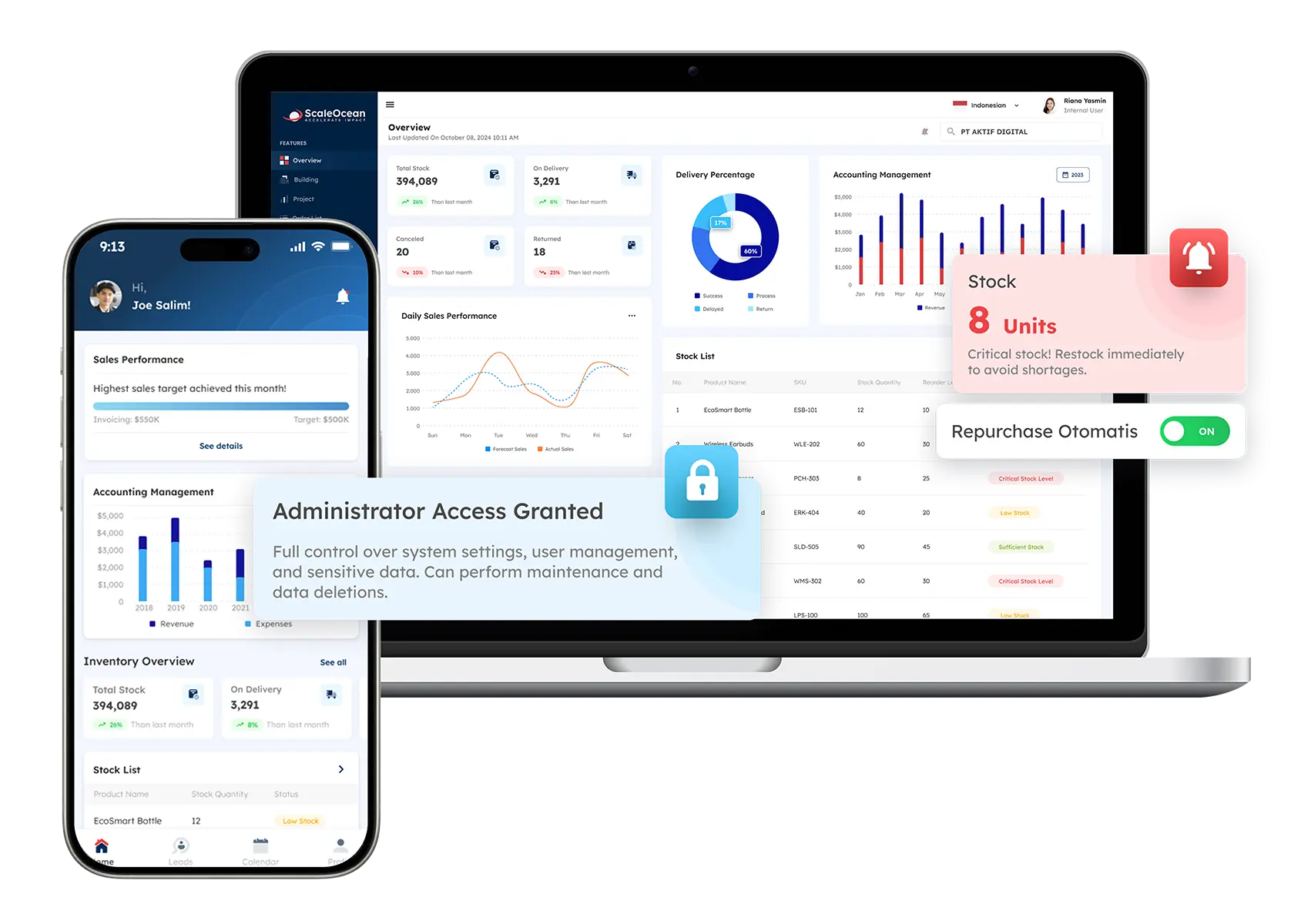As businesses grow and operations get complex, a single-tier ERP often struggles to keep up. Managing diverse functions leads to inefficiencies and data silos. The solution is a two-tier ERP system, which integrates different solutions across levels, giving you the flexibility needed for growth.
In this article, we’ll dive deep into the two-tier ERP concept, explaining how it differs from traditional single-tier systems. We’ll explore its key benefits and the common factors driving its adoption, especially in Singapore, where flexibility and scalability are paramount.
- Two-tier ERP allows businesses to use a primary ERP system at the corporate level and customized ERP solutions for subsidiaries, improving flexibility and control.
- Tier 1 vs. Tier 2 vs. Tier 3: Tier 1 ERP suits large enterprises with complex needs. Tier 2 targets mid-sized businesses. Tier 3 is for small businesses with basic functions like finance and inventory.
- The benefits of two-tier ERP include scalability, cost efficiency, flexibility, and the ability to innovate and adapt quickly to market changes and more.
- ScaleOcean’s ERP software supports two-tier ERP implementation with seamless integration, real-time data processing, scalability, and advanced security, helping businesses optimize their operations.

What is Two-Tier ERP?
Two-tier ERP refers to a strategy in which a company uses to separate its ERP system, which includes: 1. The first system acts as a reliable foundation for the entire organization. 2. The second tier consists of independent and frequently interconnected ERP systems that manage the daily operations of subsidiaries or particular locations.
The tier 1 ERP controls fundamental corporate activities such as finance, compliance, and human resources, whereas tier 2 solutions address specialized or industry-specific requirements.
Unlike a traditional single-tier ERP system, which enforces a standardized system across all entities, a two-tier ERP allows for greater flexibility and adaptability. Many worldwide organizations use this technique to improve operational efficiency and business agility.
Tier 1 vs. Tier 2 vs. Tier 3
In the world of ERP systems, choosing the right type for your business can be overwhelming. With various options like Tier 1, Tier 2, and Tier 3 ERP, each offers different features, scalability, and pricing. Here are the distinctions between them that can guide you in making a more informed decision that fits your company’s needs.
1. Tier 1 ERP
Tier 1 ERP systems are tailored for large companies and enterprises that have intricate requirements, including multinational companies or entities with a wide array of departments. These systems provide comprehensive features, significant scalability, and extensive customization capabilities.
They facilitate global operations, handle multi-currency transactions, and manage complex workflows effectively. Tier 1 ERPs are typically expensive, require dedicated IT resources, and take longer to implement.
2. Tier 2 ERP
Tier 2 ERP systems are tailored for mid-sized enterprises that have surpassed the capabilities of basic software yet do not need the extensive features provided by Tier 1 solutions. Choosing the right enterprise software ensures these businesses get the optimal functionality without unnecessary complexity.
These types of ERP software strike a favorable balance between functionality, user-friendliness, and affordability. They are specifically designed for businesses experiencing growth, typically operating within a single country or region.
3. Tier 3 ERP
Tier 3 ERP systems cater to small enterprises or startups with uncomplicated requirements. These solutions offer basic functionalities like financial management, inventory oversight, and order processing. The features of ERP finance modules in Tier 3 systems ensure essential financial tracking without complexity.
Typically, Tier 3 ERPs are straightforward to deploy, budget-friendly, and offer limited customization options. They are designed to facilitate essential business operations, making them suitable for organizations with simple processes and a limited number of locations.
Key Benefits of Two-Tier ERP
Implementing a Two-Tier ERP system offers substantial benefits to firms, especially those operating in different locations or industries with distinct requirements. This method enables firms to maintain corporate control while allowing subsidiaries or regional branches to employ ERP solutions that are tailored to their operational requirements.
Two-Tier ERP enables firms in Singapore to stay adaptable and competitive, even when regulatory compliance and market conditions differ by industry. Based on Industrial Equipment News, many large manufacturing firms have adopted this type of ERP to streamline operations by integrating global financial systems with specialized ERP solutions for production and supply chain management. The following are the primary benefits of using a two-tier ERP strategy:
1. Scalability
Two-tier ERP lets organizations perfectly tailor their ERP strategy for different business units. This approach allows for growth and adaptation without needing to overhaul the entire system, making it ideal for businesses with multiple locations or diverse operational needs.
The great flexibility of two-tier ERP ensures businesses can comply with local regulations while maintaining coherence in global operations. As companies expand, they can integrate new features or scale the system easily without disrupting daily activities, fostering long-term growth.
2. Cost Efficiency
Implementing specialized ERP systems at the subsidiary level saves money when compared to rolling out a single large-scale ERP across the entire firm. Businesses can optimize resource allocation while avoiding excessive overhead by choosing cost-effective solutions adapted to individual operating demands.
Furthermore, businesses can avoid the high cost of major adaptations necessary for a single, enterprise-wide system. Understanding ERP pricing can also help companies make informed decisions when selecting the most budget-friendly and scalable ERP solution.
3. Flexibility
Two-tier ERP offers great flexibility by allowing businesses to use different systems at various levels. Each subsidiary or unit gets a tailored system that meets its specific needs, improving operational efficiency. The advantages of hybrid ERP build on this by combining cloud and on-premise systems for even greater flexibility.
This flexibility also allows businesses to easily meet regional compliance standards without disrupting corporate processes. Each unit can function autonomously while still aligning perfectly with corporate goals, ensuring smoother coordination and improved overall performance.
4. Innovation and Agility
Two-tier ERP truly fosters innovation by letting subsidiaries adopt new technologies quickly without disrupting the entire organization. This agility allows businesses to experiment with new ideas and adjust swiftly to market demands, creating a great culture of continuous improvement.
By enabling businesses to test new technologies at the subsidiary level before full adoption, you can greatly reduce the risks tied to large-scale changes. This smart approach helps firms remain competitive and highly responsive to market shifts while easily avoiding major disruptions.
5. Improved Control and Visibility
Two-tier ERP ensures corporate-level control over vital functions like finance and compliance, while giving subsidiaries autonomy for daily operations. This dual system allows for better global performance monitoring. The mobile ERP feature enhances this by providing real-time access to critical data.
Centralized control allows businesses to oversee the entire organization while still maintaining crucial local flexibility. Better visibility across all subsidiaries helps decision-makers make informed choices and truly drive operational efficiency globally and regionally.
6. Faster Implementation
A two-tier ERP system allows for quicker deployment in subsidiaries or regional offices, as it’s tailored to each business unit’s needs. This results in faster implementation times compared to enterprise-wide systems. Addressing ERP system failures during implementation ensures smoother transitions and fewer delays.
The ability to implement specialized systems faster lets businesses start benefiting from ERP solutions sooner. This quick deployment allows companies to see immediate improvements in operations and overall efficiency, leading directly to a quicker and stronger return on investment.
7. Enhanced Compliance
Two-tier ERP helps companies meet regional compliance easily by allowing subsidiaries to use localized systems. These systems ensure that each unit adheres to specific tax laws, industry standards, and regulatory needs without impacting the corporate-level system’s integrity.
By having separate systems at the subsidiary level, businesses can significantly minimize the risk of non-compliance. This approach also reduces the burden on the corporate office, allowing them to focus on global strategy while local teams handle their regulatory needs independently.
8. Optimized Resource Allocation
Two-tier ERP lets businesses allocate resources much more efficiently by aligning the solution with each unit’s specific needs. This ensures every unit operates with the most relevant tools, boosting overall productivity without overloading staff with unnecessary features.
Optimizing resource allocation cuts operational inefficiencies, ensuring each unit is perfectly equipped to perform its unique functions. By customizing the system for individual units, businesses can easily reduce waste, streamline processes, and focus on their core competencies.
9. Better Data Integration and Analysis
Two-tier ERP integrates subsidiary systems with a central corporate system, allowing businesses to easily consolidate data across all operations. This creates a unified view of the entire organization, which greatly improves decision-making and increases visibility into overall performance.
Integrating data from multiple systems enables more accurate reporting and deeper insights into daily operations. With better analytics, businesses can track performance easily across different regions and make informed decisions that drive both growth and operational success.

Common Factors for the Adoption of Two-Tier ERP in Singapore Businesses
In today’s fast-paced business world, especially in Singapore, companies must continually look for ways to improve efficiency, reduce costs, and remain competitive. One approach that is gaining popularity is the implementation of a two-tier ERP system.
By integrating two separate ERP solutions, you can meet different operational needs at different levels of your business industry. This strategy can help overcome some of the limitations of traditional single-tier systems. Here are some common business drivers for adopting a two-tier ERP approach, including:
1. Better Alignment with Business Needs and Processes
A two-tier ERP system offers flexibility to align ERP solutions with specific business processes. Tier 1 manages company-wide functions, while Tier 2 is customized for smaller departments or regional offices. Integrating a cloud-based ERP system enhances this by offering scalability and remote access.
This tailored customization truly boosts productivity by fitting the ERP system to the unique needs of each unit. It ensures every department has exactly the right tools and functionality, enabling smoother operations and smarter decision-making across the entire business.
2. Faster Implementation and Reduced Time to Value
Two-tier ERP systems can be deployed much faster than traditional, single-tier solutions. Tier 1 ERP handles larger organizational functions, while secondary Tier 2 systems can be quickly deployed for specific business units or regional offices.
This faster rollout means you quickly realize benefits. With Tier 2 systems in place, smaller units or departments can start functioning efficiently sooner, significantly reducing the overall time to value and letting your business gain a competitive edge rapidly.
3. Improved Global Operations and Faster Adaptation to Local Needs
A two-tier ERP system is an excellent choice for managing global operations while nicely accommodating regional differences. The tier 1 ERP establishes a standardized platform, ensuring crucial consistency across core processes in all international markets.
Tier 2 ERP systems enable fast adaptation to local needs, covering things like regional regulatory compliance, managing local currencies, or specific business practices. This local flexibility ensures that regional offices operate effectively while keeping centralized control.
4. Local Compliance and Regulations
The two-tier ERP approach simplifies compliance with local regulations for multinational companies. The tier 1 ERP ensures global alignment and consistency across all business units, while the secondary system handles the specific demands of each regional market.
Tier 2 customized ERP software is precisely tailored for specific regional needs, addressing local tax laws, labor regulations, and unique industry standards. This approach not only reduces compliance risks but also allows businesses to operate far more efficiently across diverse jurisdictions.
5. Reduced Complexity for Specific Business Units
Single-tier ERP systems can become overly complex, especially for small units with unique needs. A two-tier system solves this by deploying a Tier 1 ERP for large organizational functions while using Tier 2 solutions for smaller, specialized departments.
This simplified approach reduces operational complexity by streamlining processes and workflows. It also truly enhances user adoption, as departments focus only on the features that directly impact their specific needs, avoiding unnecessary complexity.
6. Improved Resource Allocation
A two-tier ERP system intelligently optimizes resource allocation. It uses Tier 1 systems for large, enterprise-wide functions, while Tier 2 and 3 systems serve smaller business units more flexibly and cost-effectively, ensuring everyone has the right level of support.
This approach ensures resources are allocated efficiently, without unnecessarily straining the IT team or the budget. Smaller regions or departments can operate quite independently, allowing the company to focus its core resources on the areas that truly require greater support.
7. Better Control Over Specialized Functions
Businesses with specialized needs, like manufacturing or distribution, truly benefit from a two-tier ERP strategy. Tier 1 ERP handles your broad, enterprise-wide functions, ensuring consistency in core operations. Tier 2 ERP systems are then implemented for specific business units.
This approach gives you better control and customization for specific business units. This flexibility allows companies to address unique challenges in specialized areas like logistics or production, which dramatically improves overall operational efficiency where it matters most.
How Two-Tier ERP Works in Practice
In a Two-Tier ERP approach, the corporate-level Tier 1 system is seamlessly integrated with Tier 2 systems used by subsidiaries or departments, ensuring real-time data exchange and operational uniformity. This connectivity enables subsidiaries to use bespoke ERP solutions adapted to their business requirements while remaining compliant with corporate governance.
For example, financial transactions recorded in a subsidiary’s Tier 2 system are automatically synced with the Tier 1 system, ensuring accurate and aggregated reporting. This method not only simplifies operations but also improves compliance with regional legislation and industry standards, making it a viable option for multinational corporations.
Challenges of Implementing Two-Tier ERP
While two-tier ERP has many advantages, firms may encounter integration complexity, system compatibility issues, and differing regulatory compliance requirements. Effective deployment necessitates meticulous planning to provide smooth connectivity between Tier 1 and Tier 2 systems while protecting data integrity and security.
Based on ERP News, one of the biggest challenges in implementing this type of ERP system is ensuring seamless data synchronization between Tier 1 and Tier 2 systems, as discrepancies in financial reporting and compliance tracking can lead to operational inefficiencies.
1. Data Synchronization Issues
Ensure accurate and consistent data transfer across Tier 1 and Tier 2 systems with strong integration solutions. Discrepancies in financial reporting, inventory management, and compliance tracking may occur if not properly synchronized, resulting in operational inefficiencies. Businesses must use automated data mapping and real-time synchronization solutions to improve data flow and accuracy at all levels.
2. Change Management
The implementation of several ERP systems involves training and support to boost acceptance and eliminate employee opposition. A systematic change management strategy, which includes clear communication and hands-on training, is critical for achieving a smooth transition.
Furthermore, incorporating important stakeholders early in the process can boost user involvement and prevent potential system adoption issues. Choosing the best ERP software in Singapore can also simplify change management by providing localized support and compliance with regional regulations.
3. Security Risks
Managing security across many ERP systems can be difficult, making it critical to employ effective security measures to secure important corporate information. Businesses that use different systems must maintain consistent access controls and data encryption to prevent unauthorized breaches. Regular security audits and compliance checks can also assist in discovering vulnerabilities and improving overall system resilience.
Common Two-Tier ERP Use Cases
In today’s business landscape, companies are increasingly adopting this type of ERP strategy to meet specific operational needs across multiple tiers of their business. Implementing this system will help businesses maintain a robust, centralized system for core operations while empowering departments, subsidiaries, or regions to operate with specialized systems.
Here are some common use cases where a two-tier ERP strategy makes a significant impact, including:
1. Manufacturing with Specialized Production Needs
In the manufacturing sector, a Tier 2 ERP strategy benefits companies with multiple plants or diverse product lines. A Tier 1 system manages overall functions like finance and supply chain, while Tier 2 systems are tailored for individual facilities.
These custom systems address specific needs, such as production scheduling and quality management. By integrating Tier 2 systems with the corporate ERP, businesses achieve operational consistency while enabling localized management.
2. Multinational Companies with Regional Needs
Multinational organizations with subsidiaries often face challenges in managing diverse business environments. A two-tier ERP system allows headquarters to use a Tier 1 solution for global financial management and operations, while each regional subsidiary can implement Tier 2 or Tier 3 systems tailored to local regulations, language, and currency.
This setup with ERP modules can provide centralized core functions and flexibility for local offices, ensuring compliance and efficiency.
3. Retailers with Global and Local Operations
Retailers often struggle with managing global operations and localized processes. A Tier 2 ERP system allows large chains to use a Tier 1 system for enterprise functions like inventory management and financial reporting, while Tier 2 systems can be implemented for specific retail tasks, such as point of sale (POS) and promotions. This approach helps streamline global operations while enabling local stores to manage daily tasks effectively.
4. Companies in Mergers and Acquisitions
Companies involved in mergers or acquisitions often face challenges in integrating different systems. A Tier 2 ERP strategy can help by keeping the existing Tier 1 ERP system for the parent company and introducing Tier 2 ERP solutions for newly acquired businesses.
This allows for quick deployment of secondary ERP systems to manage daily operations while ensuring data integration and financial visibility with the primary system, facilitating a smooth transition and efficient operation for each company.
5. Supply Chain Management in Complex Networks
In logistics and distribution, a Tier 2 ERP system enhances control over complex supply chains. The primary ERP system manages high-level processes like procurement and inventory for the entire network. In contrast, secondary systems at individual distribution centers manage local operations, including order fulfillment and stock levels.
This approach allows businesses to keep a unified view of their supply chain while efficiently managing regional needs.
6. New Ventures and Partnerships
Two-tier ERP is ideal for new ventures and joint ventures because it allows for quick implementation and great flexibility. It enables new entities to establish their systems independently, fostering innovation while keeping investment low and operational costs easily manageable.
By using a two-tier ERP, these ventures gain autonomy to govern themselves and experiment without being restricted by the parent company’s larger, more rigid systems. This independence truly encourages creativity and agility, fostering success in their business models.
7. Regional Subsidiaries
For multinational corporations, centralizing systems across regional subsidiaries can be tricky. A two-tier ERP is the solution, allowing headquarters to keep control while enabling regional offices to operate independently with systems specifically tailored for local needs.
This system ensures full compliance with local regulations, language preferences, and currency requirements. Regional subsidiaries can make decisions quickly, while still perfectly aligning with the parent company’s global strategy, which maintains both efficiency and flexibility.
8. Independent Divisions
Independent divisions within a company truly benefit from two-tier ERP by allowing them to use separate processes. Though not separate legal entities, these divisions often have distinct business models that demand flexibility in their operational systems and approach.
By adopting a two-tier ERP, these divisions can operate without interference from the parent company’s central system, enabling them to focus entirely on their unique processes. This autonomy enhances productivity and fully supports their specialized business needs.
9. Business Unit Sales
During divestitures, where a business unit is sold, a two-tier ERP system really simplifies the transition. The separating division can migrate to its own ERP, boosting its value and simplifying the post-sale process, which ensures smooth operations throughout the handover.
This smart strategy allows the divested business unit to become an attractive acquisition target with its own ERP system ready to go. SaaS ERP features streamline the transition services agreement, reducing separation complexities and ensuring smooth business continuity.
10. Cloud Transition
Two-tier ERP is crucial for cloud migration strategies. It allows businesses to gradually move operations to the cloud, maintaining control while transitioning specific functions over time. Understanding the advantages of custom and off-the-shelf ERP helps businesses choose the right approach for cloud integration.
This strategy significantly reduces the risks associated with a full, “big-bang” cloud migration, letting companies adopt cloud ERP in smart stages. It ensures that legacy systems keep running smoothly while new cloud systems are integrated, resulting in a much smoother transition.
How ScaleOcean ERP Supports Two-Tier ERP Implementation
ScaleOcean ERP offers a scalable Cloud ERP solution for businesses looking to optimize their approach, including Two-Tier ERP implementations. It ensures seamless interaction between corporate and subsidiary-level systems, maintaining control while offering flexibility across organizational levels.
Interested in learning how ScaleOcean ERP may improve your business operations, especially in a fast-paced market like Singapore? Book a free demo today to experience its powers firsthand. The following are the primary characteristics of ScaleOcean ERP:
- Centralized Data Management: Ensures data consistency across different business units, reducing data silos. This approach enhances collaboration by allowing real-time data sharing across departments.
- Modular System: Allows businesses to implement ERP modules tailored to the needs of different departments or subsidiaries. This modular approach enables companies to scale their ERP functionalities based on evolving business requirements.
- Real-Time Operations: Provides instant data processing and reporting for timely decision-making. This capability ensures that businesses can react swiftly to market changes and operational demands.
- Scalability: Supports business growth by adapting to the evolving needs of both corporate and subsidiary operations. It allows companies to expand their operations without disrupting existing workflows, ensuring smooth transitions.
- Advanced Security Measures: Implements high-level security protocols to safeguard sensitive business data. This includes multi-layered authentication, regular security audits, and real-time threat monitoring to prevent breaches.
Conclusion
Two-Tier ERP is a strategic approach that allows firms to keep centralized control while allowing subsidiaries or business units to use customized ERP solutions. This methodology improves scalability, efficiency, and creativity by addressing a wide range of operational needs while avoiding disruptions to company processes.
Despite its limitations, such as data synchronization and security issues, Tier 2 ERP is still the preferred solution for developing businesses, particularly in fast-changing markets like Singapore.
ScaleOcean ERP provides a free demo that demonstrates the benefits of Two-Tier ERP, including seamless connection, flexibility, and cost-effectiveness. Organizations may increase efficiency and guarantee that their ERP strategy matches both corporate and regional business needs by utilizing ScaleOcean’s enhanced features.
FAQ:
1. What is a 2-tier ERP?
A 2-tier ERP is a strategy adopted by large, multinational companies where Tier 1 ERP handles financials and core processes at the corporate level, while Tier 2 ERP addresses specific needs for subsidiaries, divisions, or smaller locations. This provides flexibility and localized solutions.
2. What is the difference between Tier 1 and Tier 2 ERP systems?
Tier 1 ERP systems manage core business functions like HR, finance, and IT at a global scale for large enterprises. Tier 2 ERP systems focus on regional or smaller department needs, such as sales, marketing, and internal communications, providing more localized solutions.
3. What is Tier 2 examples?
Tier 2 examples refer to ERP systems like ScaleOcean ERP Software, which cater to mid-sized businesses or specific divisions. These systems offer targeted solutions for regional operations, similar to how focused interventions, such as social skills or self-management programs, positively impact a significant portion of users.
4. How do you define Tier 1 and Tier 2?
Tier 1 refers to core ERP systems used by large enterprises to manage critical functions like finance and HR across global operations. Tier 2 focuses on more specialized, regional needs within mid-sized companies or divisions. Similar to how banks use and characteristic ERP software Tier 1 capital for daily operations and Tier 2 capital for reserves, Tier 2 ERP systems support targeted, localized functions.











 PTE LTD..png)
.png)

.png)








.png)
.png)
















